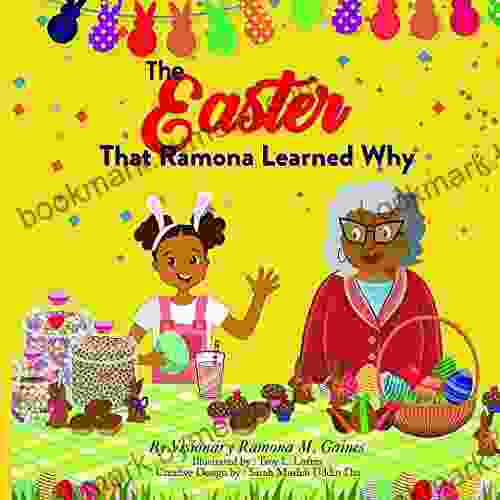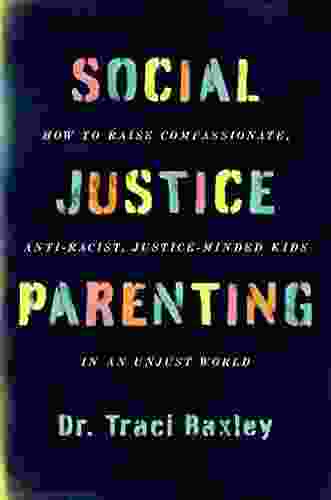How To Raise Compassionate Anti Racist Justice Minded Kids In An Unjust World

In a world that is often unjust and unfair, it is more important than ever to raise children who are compassionate, anti-racist, and justice-minded. But how do we do that? How do we teach our children to care about others, to stand up for what is right, and to work for a more just world?
4.4 out of 5
| Language | : | English |
| File size | : | 4511 KB |
| Text-to-Speech | : | Enabled |
| Screen Reader | : | Supported |
| Enhanced typesetting | : | Enabled |
| X-Ray | : | Enabled |
| Word Wise | : | Enabled |
| Print length | : | 244 pages |
This book provides parents with the tools and strategies they need to raise children who are compassionate, anti-racist, and justice-minded. It offers practical advice on how to talk to children about race, racism, and injustice, how to create a more inclusive and equitable home environment, and how to support children in taking action for social justice.
Talking to Children About Race, Racism, and Injustice
One of the most important things we can do as parents is to talk to our children about race, racism, and injustice. These conversations can be difficult, but they are essential for helping children to understand the world around them and to develop a sense of empathy and compassion for others.
Here are some tips for talking to children about race, racism, and injustice:
- Start early. You can start talking to children about race and racism as early as preschool. By starting early, you can help children to develop a positive sense of racial identity and to understand the importance of treating others with respect.
- Be honest and open. Answer your children's questions honestly and openly. Don't shy away from difficult topics, but be sure to tailor your answers to your child's age and understanding.
- Use age-appropriate language. Use language that your child can understand. Avoid using jargon or technical terms that your child may not be familiar with.
- Listen to your child. It is important to listen to your child's thoughts and feelings about race and racism. This will help you to understand your child's perspective and to better support them.
- Be patient. It takes time for children to understand the complexities of race and racism. Be patient with your child and answer their questions as they come up.
Creating a More Inclusive and Equitable Home Environment
In addition to talking to children about race, racism, and injustice, we can also create a more inclusive and equitable home environment. This means creating a space where all people are welcome and respected, regardless of their race, ethnicity, gender, sexual orientation, or other characteristics.
Here are some tips for creating a more inclusive and equitable home environment:
- Celebrate diversity. Expose your children to different cultures, languages, and religions. This will help them to develop a broader understanding of the world and to appreciate the diversity of human experience.
- Challenge stereotypes. Talk to your children about the dangers of stereotypes and how they can hurt people. Help them to understand that people should not be judged based on their race, ethnicity, gender, or other characteristics.
- Be a role model. Children learn by watching the adults in their lives. Be a role model for your children by treating others with respect, regardless of their race, ethnicity, gender, sexual orientation, or other characteristics.
- Support organizations that are working for social justice. There are many organizations that are working to create a more just and equitable world. Support these organizations with your time, money, and voice.
Supporting Children in Taking Action for Social Justice
In addition to talking to children about race, racism, and injustice and creating a more inclusive and equitable home environment, we can also support children in taking action for social justice. This means helping them to develop the skills and knowledge they need to make a difference in the world.
Here are some tips for supporting children in taking action for social justice:
- Encourage them to speak out against injustice. Teach your children that they have a voice and that they can use it to speak out against injustice. Encourage them to stand up for what they believe in, even if it is unpopular.
- Help them to develop their leadership skills. Children can be powerful leaders for social change. Help them to develop their leadership skills by giving them opportunities to lead projects and initiatives that they are passionate about.
- Connect them with other young people who are working for social justice. There are many young people who are working to make a difference in the world. Connect your children with these young people so that they can learn from them and work together on projects.
- Support their activism. When your children take action for social justice, support them. Attend their rallies, donate to their causes, and help them to amplify their voices.
Raising compassionate, anti-racist, and justice-minded children is not always easy, but it is one of the most important things we can do as parents. By following the tips in this book, you can help your children to develop the skills and knowledge they need to make a positive difference in the world.
4.4 out of 5
| Language | : | English |
| File size | : | 4511 KB |
| Text-to-Speech | : | Enabled |
| Screen Reader | : | Supported |
| Enhanced typesetting | : | Enabled |
| X-Ray | : | Enabled |
| Word Wise | : | Enabled |
| Print length | : | 244 pages |
Do you want to contribute by writing guest posts on this blog?
Please contact us and send us a resume of previous articles that you have written.
 Book
Book Novel
Novel Page
Page Chapter
Chapter Text
Text Story
Story Genre
Genre Reader
Reader Library
Library Paperback
Paperback E-book
E-book Magazine
Magazine Newspaper
Newspaper Paragraph
Paragraph Sentence
Sentence Bookmark
Bookmark Shelf
Shelf Glossary
Glossary Bibliography
Bibliography Foreword
Foreword Preface
Preface Synopsis
Synopsis Annotation
Annotation Footnote
Footnote Manuscript
Manuscript Scroll
Scroll Codex
Codex Tome
Tome Bestseller
Bestseller Classics
Classics Library card
Library card Narrative
Narrative Biography
Biography Autobiography
Autobiography Memoir
Memoir Reference
Reference Encyclopedia
Encyclopedia Ira Sukrungruang
Ira Sukrungruang Ivan Borodin
Ivan Borodin Kay Elder
Kay Elder Isabel Wroth
Isabel Wroth Rachel Dwyer
Rachel Dwyer Jackie Spanitz
Jackie Spanitz Irin Carmon
Irin Carmon Saeed Yousef
Saeed Yousef Jackie Morey
Jackie Morey P J Gerrard Gough
P J Gerrard Gough Jake Knapp
Jake Knapp J R Ward
J R Ward Jacob Smith
Jacob Smith Monica Huerta
Monica Huerta Jack Sturgess
Jack Sturgess Maddie Frost
Maddie Frost Mark Stille
Mark Stille Richard Anderson
Richard Anderson Mazie K Hirono
Mazie K Hirono N Kimball Ostrowski
N Kimball Ostrowski
Light bulbAdvertise smarter! Our strategic ad space ensures maximum exposure. Reserve your spot today!

 Bruce SnyderUnlock the Intricacies of Production with "The Structure of Production: New...
Bruce SnyderUnlock the Intricacies of Production with "The Structure of Production: New... Theodore MitchellFollow ·16.9k
Theodore MitchellFollow ·16.9k Rudyard KiplingFollow ·15.7k
Rudyard KiplingFollow ·15.7k Willie BlairFollow ·19.1k
Willie BlairFollow ·19.1k Chuck MitchellFollow ·12.3k
Chuck MitchellFollow ·12.3k Frank ButlerFollow ·5.1k
Frank ButlerFollow ·5.1k Steven HayesFollow ·8.6k
Steven HayesFollow ·8.6k Luke BlairFollow ·9.7k
Luke BlairFollow ·9.7k Norman ButlerFollow ·2.3k
Norman ButlerFollow ·2.3k

 Phil Foster
Phil FosterThe Unforgettable Easter: Ramona's Journey of Discovery...
Embark on Ramona's Extraordinary Easter...

 Levi Powell
Levi PowellThe Old City and Mount of Olives: A Journey Through...
Jerusalem, a city etched into the annals of...

 Henry Hayes
Henry HayesThe Clearances: A Journey Through Scotland's Hidden...
In the 18th and 19th...

 Edward Reed
Edward ReedUnravel the Enigmatic 'Path of Bones' with Cassie Quinn...
Step into the...
4.4 out of 5
| Language | : | English |
| File size | : | 4511 KB |
| Text-to-Speech | : | Enabled |
| Screen Reader | : | Supported |
| Enhanced typesetting | : | Enabled |
| X-Ray | : | Enabled |
| Word Wise | : | Enabled |
| Print length | : | 244 pages |














